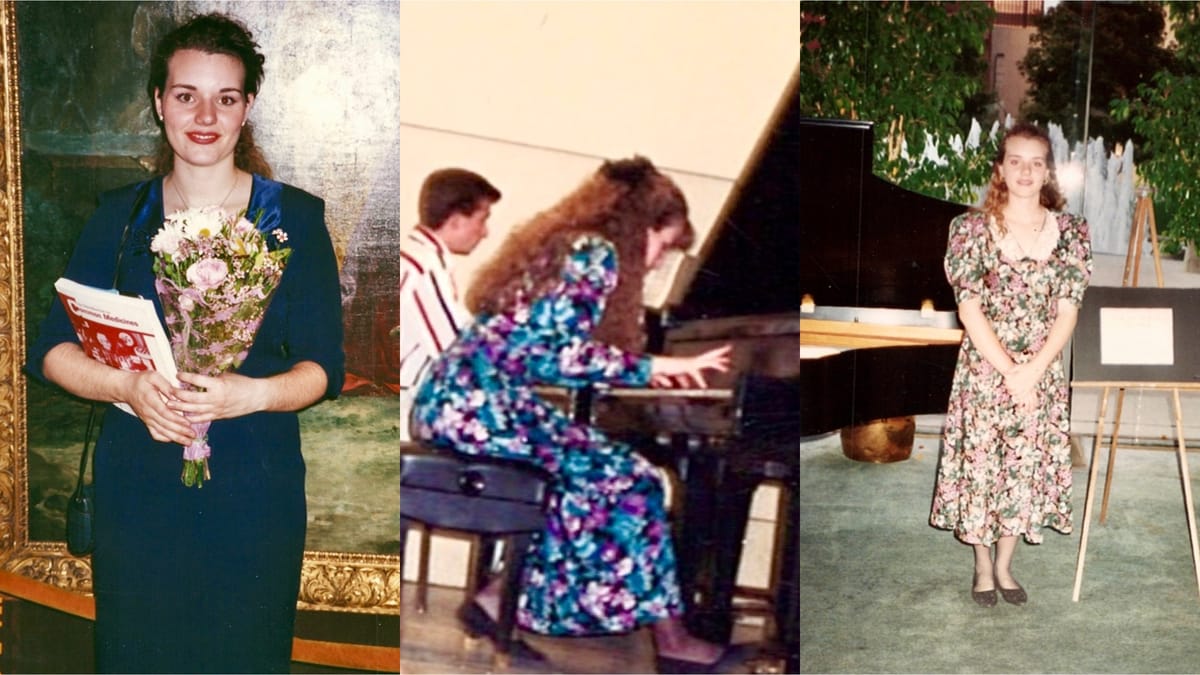Things I learned from piano competitions...

A few days ago I finished an inspiring weekend listening to some our state's best young pianists compete in the MTNA Piano Competition (state level). I chair all of the competitions for our state's music association, UMTA. As you might guess, I am a fan of piano competitions. I know not everybody is, but I'd like to tell you why I think they are beneficial for many students. I think it is important to say that not all students can compete at high levels, but there are competitions and evaluations available for beginner to advanced students in my community. I also never require a student to compete, it is completely up to them.
I have mentioned in previous posts that I switched teachers at the age of thirteen. Before switching I had performed in recitals, in churches, and in a few 'monster concerts' but I had never entered a competition. When I started with my teacher Bonnie it was decided that I would enter a competition. I became urgently motivated to make sure I was prepared. I didn't realize all of the things I would learn by regularly entering competitions for about 10 years.
Competitions excited and energized me, like an athlete gets excited for a big game. I wanted to see what I could achieve under pressure. Of course I wanted to win, which meant losing was tough, but it was an excellent chance for growth.
I have come up with a list of just some of the things that can be learned by participating in music competitions:
- Preparation: specifically 'preparation with a deadline'. Nothing is as motivating as a deadline. This is a great opportunity to make a plan, set goals, and follow through.
- Resilience: no one wins every time, in fact you may lose the majority of the time, but life has ups and downs. This is a good thing to learn early on, and in a safe space with teachers and parents to support you.
- 'Small fish in a big pond': It's nice to feel like a 'big deal' but it doesn't help you grow and progress if you are placed in situations where you will only receive praise and succeed, 'big fish in a small pond'. If you take the risk you will find an opportunity to grow by putting yourself in a new situation, even if you momentarily feel like a 'small fish in a big pond'.
- How to practice: As you prepare you will need to be efficient with your time. Mindless practice will not help you achieve your goals and wastes time. If you do not already have helpful practice strategies, regularly participating in competitions will motivate you to develop them. Check out this post for a few ideas.
- How to deal with nerves: Competitions are the perfect opportunity to test your nerve management skills. You may find that you did not deal with the adrenaline spike very well, but there is no other way to get better at something than to do the thing! I'll be digging into some simple strategies in a future post. Dr. Noa Kageyama has a wealth of information and studies on performance anxiety (specifically for musicians) that can help students discover strategies for managing nerves. His podcast and blog 'Bulletproof Musician' can be found here.
- Faster progression and increased skill: When you have a reason to polish and prepare a piece to perfection, with a deadline, you push yourself harder. Your technical and musical skills may increase as a result.
- Sense of accomplishment: No matter the outcome of the competition, you will have thoroughly memorized and prepared repertoire that you can use again for another competition or performance. This sense of accomplishment comes from completing a goal at a high level.
- Art is subjective: You will learn by experience that judges have a variety of tastes and opinions. You may even see in the judges comments that they disagree amongst themselves on how to play something. It is important to remember that determining a 'winner' like you would in a basketball game will not be possible in a competition. Judges will do their best to give value to the different aspects of your performance and come to the best conclusion they can with the information they have.
- Competing is not for everyone: While competitions can excite and motivate some students they can cause undue stress for others. Only you can decide if the benefits of a competition out-weigh the sacrifices and potential anxiety.
- How to gain perspective: I left more than one competition crying, even before I knew the results. Performing and competing involve making yourself vulnerable in front of an audience or in this case judges. It can be tough to open yourself up to criticism. At the time it may be tough to see, but competing can provide opportunities for growth and developing mental toughness.
- Judges are just people: This may sound odd, but it helped calm my nerves a little when my teacher would remind me that "They're just normal people, thinking about what they might do for dinner that night...". Judges ultimately are there to help the performer develop into an artist and usually have the competitors best interests at heart.
Is competing right for you? Competitions were the motivation I needed, but I have friends and colleagues that dreaded and avoided them. Comment below or find me on instagram @pianobycassie to share your thoughts. I'd love to hear from you!
